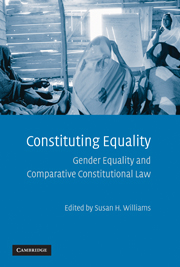Book contents
- Frontmatter
- Contents
- List of Contributors
- Acknowledgments
- CONSTITUTING EQUALITY
- Introduction: Comparative Constitutional Law, Gender Equality, and Constitutional Design
- SECTION ONE STRUCTURE
- SECTION TWO RIGHTS
- SECTION THREE CULTURE/RELIGION AND GENDER EQUALITY
- 6 Must Feminists Support Entrenchment of Sex Equality? Lessons from Quebec
- 7 Deconstructing the East/West Binary: Substantive Equality and Islamic Marriage in a Comparative Dialogue
- 8 Conflicting Agendas? Women's Rights and Customary Law in African Constitutional Reform
- 9 Gender Equality and the Rule of Law in Liberia: Statutory Law, Customary Law, and the Status of Women
- SECTION FOUR CONSTITUTIONS AND INTERNATIONAL LAW
- SECTION FIVE WOMEN IN THE PROCESS OF CONSTITUTION MAKING
- Conclusion: Gender Equality and the Idea of a Constitution: Entrenchment, Jurisdiction, and Interpretation
- Index
- References
7 - Deconstructing the East/West Binary: Substantive Equality and Islamic Marriage in a Comparative Dialogue
Published online by Cambridge University Press: 26 October 2009
- Frontmatter
- Contents
- List of Contributors
- Acknowledgments
- CONSTITUTING EQUALITY
- Introduction: Comparative Constitutional Law, Gender Equality, and Constitutional Design
- SECTION ONE STRUCTURE
- SECTION TWO RIGHTS
- SECTION THREE CULTURE/RELIGION AND GENDER EQUALITY
- 6 Must Feminists Support Entrenchment of Sex Equality? Lessons from Quebec
- 7 Deconstructing the East/West Binary: Substantive Equality and Islamic Marriage in a Comparative Dialogue
- 8 Conflicting Agendas? Women's Rights and Customary Law in African Constitutional Reform
- 9 Gender Equality and the Rule of Law in Liberia: Statutory Law, Customary Law, and the Status of Women
- SECTION FOUR CONSTITUTIONS AND INTERNATIONAL LAW
- SECTION FIVE WOMEN IN THE PROCESS OF CONSTITUTION MAKING
- Conclusion: Gender Equality and the Idea of a Constitution: Entrenchment, Jurisdiction, and Interpretation
- Index
- References
Summary
INTRODUCTION
In the scholarship dedicated to legal transplants, the binary East/West permeates the images and understanding of the ways in which Islamic legal rules travel, penetrate, and get received by the West in a comparative law dialogue. Differences are thus being assigned between the legal regimes of the East and the West, two entities considered as sharply divided. This chapter seeks to understand the politics of transnational Islamic family law in Canada, the United States, France, and Germany, through the migration of one particular Islamic legal institution: Mahr, “the gift which the bridegroom has to give to the bride when the contract of marriage is made and which becomes the property of the wife.” The issue of Mahr typically presents itself in a crisis: a married Muslim woman, engaged in a religiously structured marriage, and living in a Western liberal state, reaches out to the secular court upon the dissolution of her marriage to claim the enforcement of Mahr, presumably because her husband has previously refused to give her the amount of deferred Mahr.
Through an analysis of the case law, I explore the ways in which substantive equality is being used by courts to accept or root out Islamic law from the family of institutions that are deemed appropriate in Western countries. What influences the selection and imposition of Mahr as a gendered institution? How does law shape substantive equality in a comparative religious framework? Does the way Mahr travels affect gender equality, in both productive and reactive terms?
- Type
- Chapter
- Information
- Constituting EqualityGender Equality and Comparative Constitutional Law, pp. 157 - 172Publisher: Cambridge University PressPrint publication year: 2009



